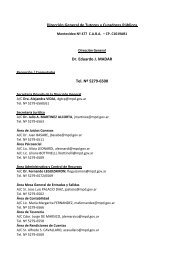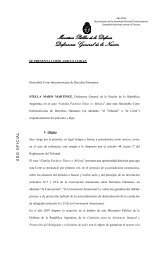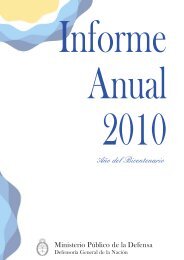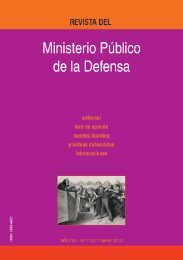Estrategias de Litigio - Ministerio Público de la Defensa
Estrategias de Litigio - Ministerio Público de la Defensa
Estrategias de Litigio - Ministerio Público de la Defensa
You also want an ePaper? Increase the reach of your titles
YUMPU automatically turns print PDFs into web optimized ePapers that Google loves.
188<br />
<strong>Estrategias</strong> <strong>de</strong> litigio para <strong>la</strong> <strong>de</strong>fensa <strong>de</strong> los <strong>de</strong>rechos <strong>de</strong> <strong>la</strong>s mujeres<br />
A fi n <strong>de</strong> contrarrestar el esencialismo feminista, Copelon incorpora <strong>la</strong> crítica<br />
que seña<strong>la</strong> que el concepto <strong>de</strong> “impotencia aprendida” refuerza los estereotipos<br />
<strong>de</strong> pasividad, <strong>de</strong>bilidad, disfunción y pérdida <strong>de</strong> iniciativa y supone “un<br />
prejuicio, con frecuencia por motivos <strong>de</strong> raza y c<strong>la</strong>se, contra <strong>la</strong>s mujeres que no<br />
parecen ser in<strong>de</strong>fensas…” 20 , el cual excluye <strong>la</strong> legítima <strong>de</strong>fensa en estos casos<br />
y eclipsa <strong>la</strong> lucha activa <strong>de</strong> <strong>la</strong>s víctimas <strong>de</strong> violencia doméstica por cambiar su<br />
situación y sobrevivir.<br />
Copelon intenta sos<strong>la</strong>yar estos prejuicios <strong>de</strong>sp<strong>la</strong>zando el concepto <strong>de</strong> impotencia<br />
aprendida hacia una consi<strong>de</strong>ración <strong>de</strong> <strong>la</strong>s restricciones <strong>de</strong> <strong>la</strong> mujer<br />
para irse:<br />
Las mujeres carecen <strong>de</strong> medios económicos y sistemas <strong>de</strong> sustento para encontrar<br />
refugio y ver por sí mismas y por sus hijos […] a medida que <strong>la</strong> violencia aumenta<br />
[…] <strong>la</strong>s mujeres maltratadas incrementan sus esfuerzos por buscar ayuda […] los<br />
autores atribuyen <strong>la</strong> no obtención <strong>de</strong> ayuda a <strong>la</strong> insufi ciencia <strong>de</strong> <strong>la</strong> respuesta y los<br />
recursos comunitarios21 .<br />
Dentro <strong>de</strong> <strong>la</strong>s restricciones refi ere <strong>la</strong> relevancia <strong>de</strong>l “ataque <strong>de</strong> <strong>la</strong> separación”,<br />
i<strong>de</strong>ntifi cado por Martha Mahoney:<br />
… en el momento <strong>de</strong> <strong>la</strong> separación o el intento <strong>de</strong> separación —para muchas mujeres<br />
el primer encuentro con <strong>la</strong> autoridad <strong>de</strong> <strong>la</strong> ley— <strong>la</strong> búsqueda <strong>de</strong> control <strong>de</strong>l maltratador,<br />
con frecuencia se torna más agudamente violenta y potencialmente mortal 22 .<br />
Como resultado <strong>de</strong> este proceso, en 2000, el Comité <strong>de</strong> Derechos Humanos<br />
<strong>de</strong> Naciones Unidas indicó que <strong>la</strong> violencia doméstica pue<strong>de</strong> originar a <strong>la</strong> vio<strong>la</strong>ción<br />
<strong>de</strong>l <strong>de</strong>recho a no ser sometido a torturas ni a malos tratos, a tenor <strong>de</strong>l<br />
artículo 7 <strong>de</strong>l Pacto Internacional <strong>de</strong> Derechos Civiles y Políticos, y remarcó<br />
<strong>la</strong> necesidad <strong>de</strong> que los estados adopten medidas “cuando los miembros <strong>de</strong> <strong>la</strong><br />
familia mantengan encerrada a <strong>la</strong> mujer y <strong>la</strong> importancia <strong>de</strong> ve<strong>la</strong>r por que se<br />
exija que haya procedimientos probatorios justos” 23 .<br />
En 2001, <strong>la</strong> Comisión Interamericana <strong>de</strong> Derechos Humanos examinó el<br />
caso <strong>de</strong> María da Penha, víctima <strong>de</strong> violencia física y psicológica a manos <strong>de</strong> su<br />
20 Copelon, Rhonda, 1997, p. 118, hace referencia, en este punto, al trabajo <strong>de</strong> Elizabeth M. Schnei<strong>de</strong>r,<br />
“Describing and Changing: Women´s Self-Defense Work and the Problem of Expert Testimony<br />
on Battering”, en Women´s Rights Law Reporter, 9, 1986, entre otras.<br />
21 Copelon, Rhonda, 1997, p. 119.<br />
22 Copelon, Rhonda, 1997, p. 119, se refi ere a Martha Mahoney, “Legal Images of Battered Women:<br />
Re<strong>de</strong>fi ning the Issue of Separation”, en Michigan Law Review. Volume: 90. Issue: 1, 1991, p. 1.<br />
23 Véase CAT/C/QAT/CO/1, párr. 22., Human Rights Committee general comment No. 28 (2000)<br />
on article 3 (Th e equality of rights between men and women), párr. 11.







